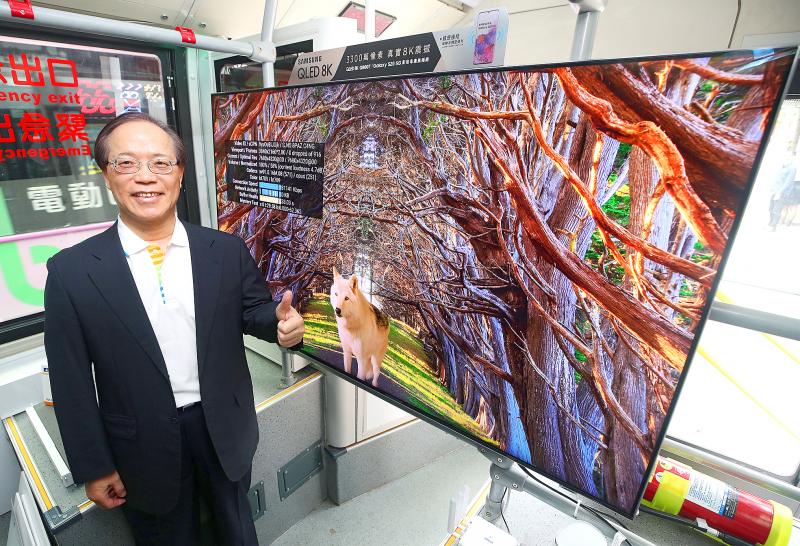Chunghwa Telecom Co (CHT, 中華電信) yesterday said that it expects its number of 5G subscribers to reach 1 million within a year of the new wireless technology’s commercial launch, adding that the uptake of 5G would be similar to that of 4G.
The company accumulated 1.33 million 4G subscribers in the 12 months after it rolled out its 4G services in June 2014.
Chunghwa is expected to launch its 5G services on July 1.

Photo: CNA
Yesterday, it demonstrated a 5G bus equipped with advanced driver-assistance systems (ADAS) in Taipei.
People touring Taipei’s Xinyi District (信義) can use the bus free of charge for the next three weeks, the company said.
“We expect the company’s 5G growth curve will not be different from that of its 4G [subscriptions],” Chunghwa Telecom executive vice president Lin Kuo-feng (林國豐) told reporters on the sidelines of a news conference to introduce the bus, which has 5G connectivity.
South Korea, which in April last year became the first nation to offer 5G services, could provide a reference for Taiwan in terms of its 5G adoption rate, said Max Chen (陳則仕), president of Chunghwa Telecom’s mobile business.
As of April, South Korea had seen its 5G penetration rate reach more than 9 percent, Chen said.
However, the COVID-19 outbreak and other factors, such as 5G tariffs, might affect the uptake of 5G services in Taiwan, he said.
Chunghwa Telecom has sold between 10,000 and 20,000 5G phones so far, and the adoption of 5G phones would grow explosively when retail prices drop to about NT$10,000 (US$337) in the second half of next year, he said.
The company plans to offer five 5G-enabled smartphones from Samsung Electronics Co, LG Electronics Co and Sony Corp, Chen said, adding that HTC Corp (宏達電) might join the list later.
The company plans to spend more than NT$27 billion deploying wireless networks in the next three years, he said.
That compares with Taiwan Mobile Co’s (台灣大哥大) plan to spend NT$13.47 billion on mobile broadband equipment over the next three years.
Chunghwa last week became the nation’s first telecom to obtain a 5G commercial license from the National Communications Commission.
Far EasTone Telecommunications Co (遠傳電信) obtained its 5G license yesterday.
Far EasTone, which plans to roll out its 5G services this summer, has forecast that 15 percent of its subscribers would switch to 5G within 12 months of the service’s launch.
According to the Regulations for Administration of Mobile Broadband Businesses (行動寬頻業務管理規則), a telecom must launch its 5G service within six months of receiving the license.

In Italy’s storied gold-making hubs, jewelers are reworking their designs to trim gold content as they race to blunt the effect of record prices and appeal to shoppers watching their budgets. Gold prices hit a record high on Thursday, surging near US$5,600 an ounce, more than double a year ago as geopolitical concerns and jitters over trade pushed investors toward the safe-haven asset. The rally is putting undue pressure on small artisans as they face mounting demands from customers, including international brands, to produce cheaper items, from signature pieces to wedding rings, according to interviews with four independent jewelers in Italy’s main

Japanese Prime Minister Sanae Takaichi has talked up the benefits of a weaker yen in a campaign speech, adopting a tone at odds with her finance ministry, which has refused to rule out any options to counter excessive foreign exchange volatility. Takaichi later softened her stance, saying she did not have a preference for the yen’s direction. “People say the weak yen is bad right now, but for export industries, it’s a major opportunity,” Takaichi said on Saturday at a rally for Liberal Democratic Party candidate Daishiro Yamagiwa in Kanagawa Prefecture ahead of a snap election on Sunday. “Whether it’s selling food or

CONCERNS: Tech companies investing in AI businesses that purchase their products have raised questions among investors that they are artificially propping up demand Nvidia Corp chief executive officer Jensen Huang (黃仁勳) on Saturday said that the company would be participating in OpenAI’s latest funding round, describing it as potentially “the largest investment we’ve ever made.” “We will invest a great deal of money,” Huang told reporters while visiting Taipei. “I believe in OpenAI. The work that they do is incredible. They’re one of the most consequential companies of our time.” Huang did not say exactly how much Nvidia might contribute, but described the investment as “huge.” “Let Sam announce how much he’s going to raise — it’s for him to decide,” Huang said, referring to OpenAI

The global server market is expected to grow 12.8 percent annually this year, with artificial intelligence (AI) servers projected to account for 16.5 percent, driven by continued investment in AI infrastructure by major cloud service providers (CSPs), market researcher TrendForce Corp (集邦科技) said yesterday. Global AI server shipments this year are expected to increase 28 percent year-on-year to more than 2.7 million units, driven by sustained demand from CSPs and government sovereign cloud projects, TrendForce analyst Frank Kung (龔明德) told the Taipei Times. Demand for GPU-based AI servers, including Nvidia Corp’s GB and Vera Rubin rack systems, is expected to remain high,